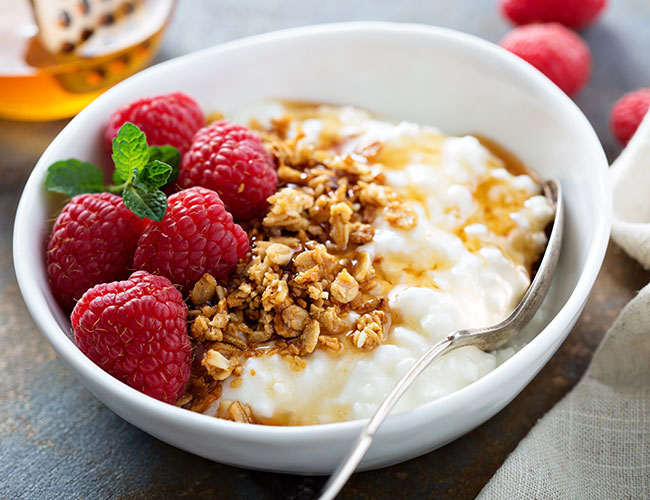
Skyr, Greek yogurt, quark, or low-fat cottage cheese
"All forms of low-fat dairy are high in essential amino acids, which are the 'building blocks' of muscle tissue," fitness and nutrition expert Michael Matthews tells us. "They also contain large amounts of a particular kind of protein called casein, which digests slowly and helps you stay full longer."
Dairy products like greek yogurt and low-fat cheeses are also one of the best sources of calcium, which the body needs to metabolize fat, he explains. And that's not to mention how delicious these foods taste when combined with " filling, nutritious, low-fat additions like berries, bananas, and oatmeal."
"My personal favorite is skyr (icelandic yogurt), which is made with slightly different cultures than Greek yogurt, giving it a creamier, tangier texture, but all kinds of low-fat fermented dairy will offer similar benefits for fat loss and muscle gain," he says. Yum!
"Greek yogurt is low in carbs and high in protein. In most cases, my clients have a hard time looking to increase their protein intake into their snacks, and Greek yogurt is an excellent way to achieve that,” registered dietitian Brenda Peralta agrees. “One cup a day provides around 15-20g of protein which is more than enough for a snack.” Game changer!
Chicken breast
"Chicken breast is to most bodybuilders what the dollar is to the economy—an essential commodity that helps the whole plan run smoothly," Matthews, who is the the author of Muscle for Life: Get Lean, Strong, and Healthy at Any Age explains.
"Not only is it a rich source of protein and essential amino acids, it contains very little carbs and fat and relatively few calories, which means it’s ideal for people who are looking to build lean muscle and lose fat," he advises. Additionally, chicken breast is high in an amino acid called leucine, which is important "because it plays a vital role in kick-starting your body’s muscle-building machinery." Matthews also points to the versatility of chicken as to why its such a wonder food. "You can also prepare chicken breast in myriad fresh and flavorful ways, such as in stir fries, stews, soups, and salads, so you can eat it multiple times per week without getting bored." And now, isn't that what we all really want?
"Lean meats, including chicken, turkey, and fish, are excellent protein options," Allison Herries, MS, RDN agrees. "This is because the majority of calories in lean meats come directly from protein." For example, 100 grams of chicken breast provides around 31 grams of protein with only 165 calories, she explains. Wow!
Lean seafood
"Gram-for-gram, lean seafood is arguably the best source of whole-food protein," Matthews says. "It's usually about 90+% protein by weight and low in carbs, fat, and calories, and contains an abundance of micronutrients." Fish like tilapia, tuna, catfish, carp, and cod are loaded with vitamins such as vitamin A, B, and D, and minerals like iron, zinc, iodine, magnesium, selenium, and potassium, he says.
"These keep your body feeling strong and healthy, and they’re key players in countless processes that help you build muscle and lose fat, such as cellular repair, metabolizing food, hormone production, and muscle function." Fatty fish like salmon, mackerel, and herring are also great options, he advises, because they’re "high in omega-3 fatty acids, which have been shown to prevent weight gain, optimize fat loss, and accelerate muscle growth." *Adds to shopping cart immediately*
Lean red meat, such as sirloin
"Red meat often gets a bum rap for its association with heart disease and cancer, but a few decades of research suggests this reputation is undeserved," Matthews tells us. "In reality, lean cuts of red meat, such as beef sirloin, pork loin, and 90% lean ground venison are excellent sources of essential amino acids and packed with nutrients like B vitamins, iron, and zinc that are important for maintaining optimal health." They’re also highly satiating, which means they’re harder to overeat than many other foods, he explains.


